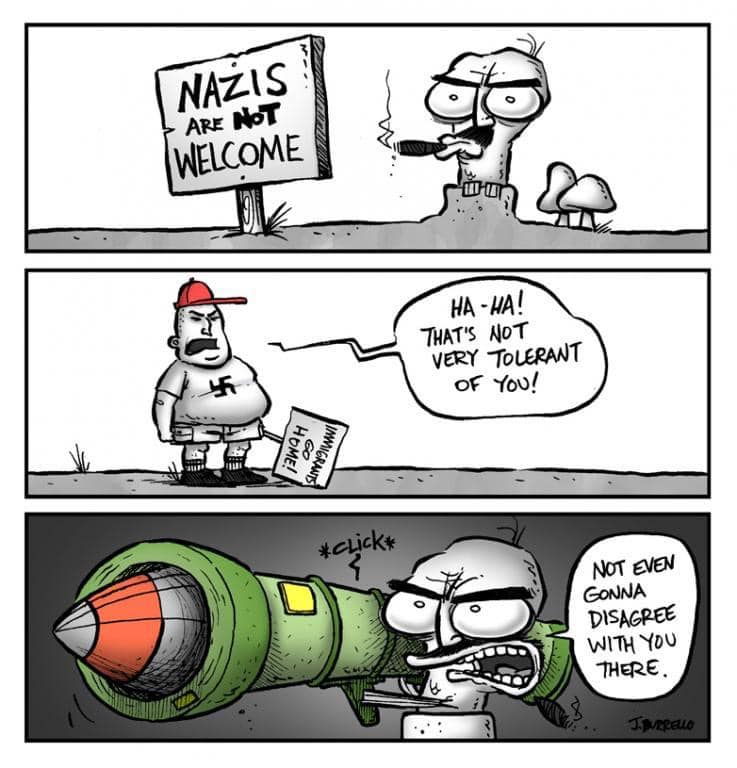this post was submitted on 19 Jul 2024
737 points (98.2% liked)
Political Memes
5433 readers
3595 users here now
Welcome to politcal memes!
These are our rules:
Be civil
Jokes are okay, but don’t intentionally harass or disturb any member of our community. Sexism, racism and bigotry are not allowed. Good faith argumentation only. No posts discouraging people to vote or shaming people for voting.
No misinformation
Don’t post any intentional misinformation. When asked by mods, provide sources for any claims you make.
Posts should be memes
Random pictures do not qualify as memes. Relevance to politics is required.
No bots, spam or self-promotion
Follow instance rules, ask for your bot to be allowed on this community.
founded 1 year ago
MODERATORS
you are viewing a single comment's thread
view the rest of the comments
view the rest of the comments

There is no paradox of tolerance. It's the social contract of tolerance. Break the social contract, receive the consequences.
Edit: I promise I understand the concept as a paradox as well. I chose to frame it the way I did because the paradox is solved by reframing the situation.
Exactly! As this image I saved years ago explains
Now I’m curious what was cropped out of the bottom there
Given the image quality, I have saved a version which has been repeatedly recycled. I think this is the original version - at least it includes the cropped bit? I just posted it exactly as I saved it
SOURCE
https://duckduckgo.com/?hps=1&q=The+Paradox+of+Tolerance+disappears+if+you+look+at+tolerance%2C+not+as+a+moral+standard%2C+but+as+a+social+contract.&ia=images&iax=images
Came back with receipts! I love it
Well said! I like this framing
It's a paradox. Lots of paradoxes that have solutions in math, science, and philosophy are still called paradoxes. The name doesn't drop just because it's resolved. It just means that when you first approach it, it seems to defy what you know.
There is a paradox in limitless tolerance. Applying a social contract makes it limited, removing the paradox.
The paradox is that tolerating intolerance leads to intolerance replacing tolerance.
I don't know what your issue with the paradox of tolerance is. Even in your "solution" it is ultimately true that there is the paradox of tolerance.
The paradox is that a maximally tolerant society has to be intolerant to the intolerant.
Breaking the social contract would make you intolerant and the tolerant people who follow the social contract would have to be intolerant towards you to protect the social contract as just removing the necessity of tolerance towards the intolerant wouldn't create a deterrent as the tolerant people mostly would treat the intolerant decently as they aren't bad people and wouldn't inflict unnecessary harm. So you need to communicate to the tolerant people that they have to be intolerant towards the intolerant to protect the social contract, so the tolerant would inflict the necessary harm to the intolerant to create a deterrent.
So to maximize the effects of the social contract, the social contract would require intolerance from the tolerant.
But that's how the "contract" explanation "solves" the paradox. Nobody is inherently tolerant. I'm just tolerant towards you because our social contract ensures mutual tolerance. One "clause" of the contract is however that I don't have to be tolerant towards you if you breach the contract with anyone else. Or in other words, if I see you being intolerant, I have the right to be intolerant towards you, too. Whether I'm "obliged" to be intolerant towards you is another question, but you could construe it as another "clause" of the social contract.
The paradox is about being "obliged" to be intolerant to protect (and maximize) the tolerance.
If you don't actively act against intolerance, you allow the intolerance to exist, allowing intolerance will result in more intolerance.
GP is probably working off a common and wrong definition of "paradox". It's often thought of as something that's logically inconsistent and cannot be resolved, but that's not how the word is actually used. Rather, it's something that seems logically inconsistent, but it can be resolved, and we have to hunt around for a solution. In this case, the solution is to think of tolerance as a peace treaty that binds people who agree with it.
To be fair there is more than 1 definition.
I think it is fairly obvious that the "inventor" of the paradox of tolerance didn't use the term with the meaning that it is self-contradicting and therefore wrong but rather the alternative definition of "a statement that is seemingly contradictory or opposed to common sense and yet is perhaps true". And the peace treaty/social contract solution is assuming that you can't be tolerant to the intolerant, so they agree on "yet is perhaps true" part. And the first section is obviously true.